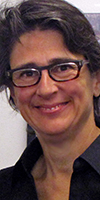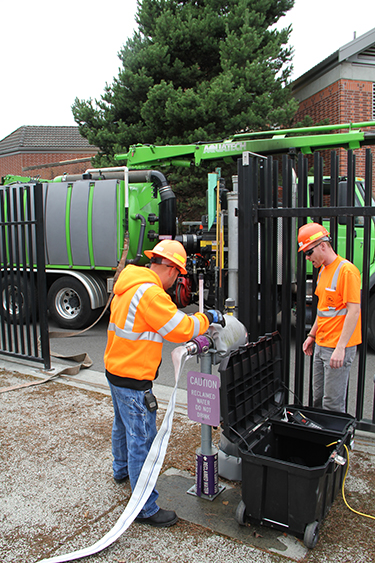|
Subscribe / Renew |
|
|
Contact Us |
|
| ► Subscribe to our Free Weekly Newsletter | |
| home | Welcome, sign in or click here to subscribe. | login |
Environment
| |
 |
September 24, 2015
Kirkland taps county’s purple pipes for recycled water
Special to the Journal

Brown
|

Elardo
|
“The right water for the right use” is the tagline for King County’s Recycled Water Program. For the city of Kirkland, it represents a new approach to water resource management amid historic drought conditions.
For water in the Pacific Northwest, there hasn’t been a year quite like the one in 2015. From May to late August, barely an inch of summertime rain fell — less than Phoenix. Conditions were so dry the coastal rainforest caught fire, mountain snowpack was just 16 percent of normal, and rivers that dwindled to record low levels are perilously warm for salmon now swimming upstream to spawn.
Late summer rains, while helpful, have not made up for the water deficit, and forecasters are calling for drier than normal conditions to continue through fall.
With no immediate relief in sight for low snowpacks and drought, King County and Kirkland decided to take a new approach to water resource management that goes beyond conservation alone.
Under an agreement signed earlier this month, the city will have access to high-quality recycled water produced at King County’s Brightwater Treatment Plant for a variety of maintenance services including street sweeping, tree irrigation and cement mixing — all uses that don’t require fresh, drinkable water.
City workers will access the water at a filling station at King County’s York Pump Station in Redmond, using trucks to transport it to locations where it can be put to good use for the city and its residents. A recent example is a city sewer-line cleaning project in which workers outfitted a 1,500-gallon eductor truck with a high-powered nozzle connection and a jet-propulsion vacuum to remove debris and unwanted material from inside the sewer system.
The production and use of recycled water, also known as reclaimed water, is strictly regulated by the state Department of Ecology to ensure safety. As with lake or river water, recycled water is safe for human contact, irrigation, crops and other uses, but it is not approved for drinking. Recycled water is distributed through a separate set of purple pipes, the universal color for recycled water infrastructure, to guarantee it will not be mixed with certified drinking water supplies.
King County has been safely recycling and reusing water from its treatment plants in Renton and Seattle for over 20 years. What’s particularly unique about the Brightwater plant, which came online in 2011, is that it was designed with an advanced membrane bioreactor technology that treats nearly all the wastewater there to the state’s Class A reclaimed water standard.
Brightwater has the capacity to produce up to 21 million gallons of recycled water each day for distribution along separate, dedicated purple pipelines that run to Swamp Creek in Kenmore and to Redmond through the Sammamish Valley, so there are many future opportunities to provide more customers in these areas with a reliable, drought-proof source of water.
For Kirkland, tapping into this resource will support its effort to reduce water consumption by 10 percent at the urging of regional water providers. The voluntary water curtailment — encouraged by the cities of Seattle, Tacoma and Everett — has been in effect since mid-August, so far with positive results.
Not only will Kirkland save on its water consumption with recycled water, it will also save on costs. Under the agreement terms, King County’s recycled water rate will be as much as 50 percent lower than drinking water that would otherwise be purchased and used for the same purposes.
Just as important, the city’s use of recycled water leaves more water in rivers for fish to thrive, reduces the need to discharge highly treated wastewater into Puget Sound, and benefits water quality by returning nutrients to plants and crops.
Recycled water contains nitrogen, phosphorus and potassium — beneficial nutrients that can lessen the need for fertilizers. Plus, it’s safe, even for edible plants and produce.
Crops in California and Florida are commonly irrigated with recycled water treated to the same high standards as King County’s recycled water. Anyone who purchases produce from a large chain grocery store has almost certainly consumed produce irrigated with recycled water.
Locally, recycled water is keeping soccer fields green, including 60 Acres Park in Redmond and Starfire Sports in Tukwila where the Seattle Sounders practice. One of King County’s biggest customers is Willows Run Golf Course, which uses recycled water on its verdant fairways.
Willows Run is one of the Northwest’s only certified Salmon Safe golf courses because it significantly reduced its use of chemical fertilizers and curtailed irrigation water withdrawals out of the Sammamish River, a salmon-bearing waterway particularly stressed by the drought.
King County and Kirkland are excited about the potential for this alternative water resource, and have embarked on a study of the future expanded use of recycled water produced at the Brightwater Plant. The study will include a demand analysis, potential customers, possible distribution alignments, implementation policies and costs.
Make no mistake, water conservation needs to remain the top priority across the region during the drought. Recycled water is currently available in specific areas near King County’s Brightwater and South Treatment plants. Offering it to those nearby as an alternative water source is a smart way to support current conservation efforts.
Recycled water is the right water for the right use. For King County and Kirkland, it’s the right time to put those words into action to wisely manage water resources in a growing and increasingly thirsty region.
Kathy Brown is director of Kirkland’s Public Works Department, where she is responsible for its operations, budget and programming. She holds a bachelor’s degree in Germanics from the University of Washington.
Pam Elardo, PE, is director of King County’s Wastewater Treatment Division. Elardo holds a master’s degree in environmental engineering and a bachelor’s degree in chemical engineering, and is a certified Group IV Wastewater Treatment Plant Operator.
Other Stories:
- LID development training is a game changer here
- Survey: Shannon & Wilson
- Survey: Ridolfi
- Survey: Climate Solutions
- Survey: O’Brien & Co.
- Survey: Cascadia Consulting Group
- Survey: Golder Associates
- How deep green buildings can educate kids
- Here’s how to improve environmental health and safety
- New Ecology cleanup guidance: mirage or oasis?
- Drought heats up battle over water rights
- Designing infrastructure to combat climate change
- Building green? Don’t forget green financing
- Survey: Innovex Environmental Management



